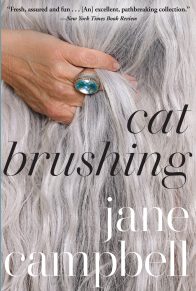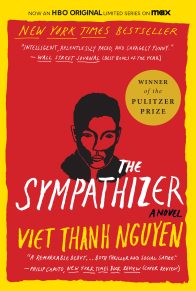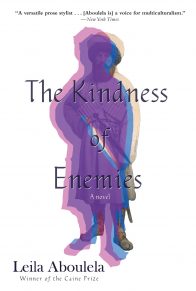Another in the long line of misunderstandings in their shared history, what caused Xerxes and Darius Adam to vow never to speak again, really began with a misplaced anecdote, specifically an incident that happened many years before in the summer of Xerxes’s twelfth year, known always in the Adam household as “the summer when Darius Adam began terrorizing the neighbors’ cats,” known privately to Xerxes’s future self as “the summer in which I realized something was very wrong with my father, something that would cause us to never have a normal father-son bond—the summer, years later, accidentally triggering the very last straw that would cause us to never communicate again.” Ever? “Well, wishful thinking, for starters.”
Darius Adam began with kindness, kindness and some deception. He began by befriending them: Apartment #14’s tabby Tabitha, #3’s Pedro, #29’s BooBoo (neither Xerxes nor his father knew for sure if this was the cat’s actual name, hearing it only in the daily coos of Ms. Bialik or Ms. Bialock, whose name they weren’t sure of either), and the two nameless identical black kittens who belonged to either #11 or #13 or both, who traveled in pairs and answered to either one door or the other or both.
Gorbeh, being the Farsi word for cat, was what Darius Adam would resort to when all else failed: “Here, gorbeh, here, little pretty gorbeh, c’mon, now, damnit, gorbeh.” He lured the gorbehs with bowls of milk which rarely worked—he blamed it on Xerxes’s mother’s insistence on only buying skim, something that not only he disapproved of, but apparently the goddamn everyday cats did as well—and so he moved on to cheese singles, which worked for some, especially BooBoo. In the end, he actually began frying slices of liver, taking a few bites himself, playfully offering some to Xerxes—who replied with the children’s universal gag face, glad to see the household liver supply dwindle for this cause—and to his wife, to rile her up, for she found the investment a terrible waste, when for one week all we’ve had are leftovers, when I could only dream of liver, she’d claim, every day insisting she was going to make it that night’s meal. The cats responded to liver. And when the liver was done for good—because Xerxes’s mother eventually retaliated by ceasing to purchase liver altogether—they responded to cookies. It was soon discovered that the gorbehs had a thing for her favorite pecan-sandy cookies. It was as if before she could even attempt to draw the line, the very concept of lines had become obsolete. Everything was game.
One by one he lured them into their house. Xerxes’s mother was beside herself: Cats in the house—what’s next! It was almost as if the answer to that question was, Prostitutes—that’s what’s next! Xerxes thought to himself, imagining his father dangling fried meat at these forbidden for-sale women that he’d only just begun seeing in movies—attracting all sorts of crawling, purring, fishnetted, bed-headed women that smelled like a rumored musk he couldn’t imagine but assumed was the scent of sex, something furry and sweaty and sweet. But the cats tended to stay close to the door, as nothing about the depths of the Adams’ indoors interested any of them. Darius Adam would crouch to their level to negotiate with hands full of cookie crumbs, letting them timidly sniff and lick, and then with an urgency that Xerxes seldom heard in his father, he’d order Xerxes to bring him the bag. Xerxes begrudgingly would bring the canvas bag that was draped on his father’s armchair, next to the Basic Algebra textbooks and ungraded student papers, the piles Xerxes’s mother and Xerxes were never to touch—which Xerxes only once did and discovered a strange postcard with a paradisal sunset scene signed “Miss u—u best teacher man! Hugs&kiss, CeCe,” which taught him never ever to go there again. He cringed at the sound the bag made—something like a possessed tambourine girl—a strangely heavy bag overstuffed with an ambitious supply of bell-studded cat collars. Xerxes believed his father when he said, See, they made these for one reason and one reason only, and that is my reason: to save. These are not gorbeh presents, he reminded them—his mother immediately reaching in the bag for the receipt, moaning about the expense when she didn’t even have a winter coat, when her pumps were busted—this is a necessity, he’d declare. It was a necessity that he had to invest in, that he had been called on to invest in, he reminded them, because certainly if the neighbors were good cat owners, each and every one would have done this. But because they failed, someone had to. Xerxes knew what he meant although he took some unspoken objection with the had to; his mother didn’t understand at all and so she bit her tongue and instead did that more powerfully infuriating thing of head shaking all the way through his process. Madness, she would think. Don’t say a word, especially in the case of the word not being a nice word, his father would say, messing up the saying, perhaps purposely; he often botched his usually near-perfect English to make a point, Xerxes suspected, as if to say, Who cares about this bastard tongue? In any case, refraining from words-that-are-not-nice-ones—unless you were Darius Adam, that is—had become a family rule in their house of swallowed discontentment, of several future decades’ worth of ulcers.
I take then you two are happy living in a battlefield?
I take you like dodging daily carnage? Remind you of home?
Death all around you—I take you think that’s an acceptable sight?
Tell me, are you Adam or gorbeh?
Xerxes knew his father believed in a better good, that he was acting out of a certain humanitarian manifest destiny to institute right among all mammals of the modern domicile. He was trying to save. Save themselves in the end, via saving the spring’s batch of blue jays who had suddenly, in their cheery oblivious way, taken residence among the palms and oaks of their conflicted suburban California neighborhood, in particular in their apartment complex, “Eden Gardens,” as the sign read (to the embarrassment of Xerxes, who often found himself just shrugging when his teachers or friends or the others of the town’s home-owning gentry asked his address and wondered, “Oh, is that The Lanai? Or are you Tropical Terrace? Oh, Eden Gardens?”) The blue jays had come noticed by no one really, Xerxes was sure, except his father who would rush to their balcony, daily, and call out, Look! Look! Look! Look . . . blue jays. The birds would make lackluster eye contact, maybe they would chirp—Sing! Xerxes’s father insisted, they really do sing—and then they would be off with their manic flutter.
Happy-go-lucky idiots, Xerxes thought, dancing on a death trap like that, the fools. Because of all the apartment buildings, why theirs? Why at the only pets-welcome complex on the block? Eden Gardens’ expansive animal kingdom had no room for easily conquered fragile types—they already had the black potbellied pig on a leash belonging to the lanky Jesus-looking man that Xerxes’s mother and father knew only as The Drug Dealer, and who Xerxes, although usually ready to disagree with his folks, had concluded, to his own shock, was a drug dealer; the triplet collies belonging to Silent-Arts-and-Crafts-Lady; the ancient pit bull belonging to The Mexicans; the guinea pigs on leashes belonging to the Weird Old Chinese Man; the buck wild ferret mothered by The Sorority Girls; and a rumored monkey that no one ever saw (apparently a ringtail—”the not-in-jungle-type, you know, the type the crazies by the sea get, the collecting money kind, like with vests, with two chinking gold music-makers, you know—but without all that, you know,” claimed their building manager, a man they called The Pelican because of his unpronounceable Romanian name, and also because of his facial structure) . . . they had all walks of life, on every rung of the food chain, in Eden Gardens. But the gorbehs topped them all. They were the staple pet—everyone who didn’t have something more exciting, something more far-fetched, something more California-crazy, had cats, except the Adam family, who had . . . nothing.
We have a pet Xerxes! (Xerxes deeply resented his mother’s joke, from age seven, when he first comprehended its casual insult.) Animals anyway, she would growl, are dirty.
Says Allah and Allah only, his father would laugh. How ignorant your mother is.
What do you want from me? she would hiss. A horse, a donkey, a hippo, puppies, and rats everywhere?
Maybe something small, his father would say quietly, spookily, his gaze lost somewhere back in the spectacle of a stark boyhood dream, maybe even a bird.
Other than that Xerxes had never heard a word about birds—any interest in them, any fascination with, any desire to rescue, any sense of a mission for—not a single mention of them from Darius Adam. And then with the blue jays’ sudden arrival in May 1988 and their systematic serial slaughtering by June, birds suddenly became king. Dead gave their ends too much dignity, Xerxes thought, agreeing with his father that their aftermaths, the killers’ nonchalantly relinquished evidence, all made the cause more noble. The dead blue jays appeared splattered, flat, like ink-soaked envelopes, stamped and razzled and bludgeoned and sucked and maybe even left half-alive in some flatironing ritual of the grisly cats, who all killed the same—Unless it’s one killer, one bloodthirsty gorbeh, his father speculated at one point, but one is all it takes to spoil the bunch—like racism, the whole race suffers when one raceman wrongs. It was true. Xerxes especially felt his father’s pain, when he’d witness him coming home from work those evenings, suddenly less lazy-eyed and dazed from overwork, but instead disturbed and jittery at the doorway, rushing to wash his hands, then sniffing them, shuddering, biting his lip, looking downright rabid—those were the signs that his father had just discarded a dead one.
He did the deed only once in front of Xerxes, on the way to school one day, when Xerxes came within inches of a dead bird. “Stop!” yelled his dad, shoving him into a rosebush. Xerxes, furious, saved himself from mass-pricking and watched as his father yelled, “Don’t watch! Turn around! Run to the car!” His father meanwhile crouched down—as usual, totally unversed in child psychology, telling himself his child had done just as he’d said, looked away or left—and reached into his pocket and pulled out a ready plastic Baggie. To Xerxes’s horror, it was the same type of ziplock bag that his beef cutlet sandwich was always packed in. His father, by this point, was always ready for the recurrence of his waking nightmare with a few Baggies at all times in his pockets, plus a scooping instrument Xerxes also knew well, the plastic spoon—again, to Xerxes’s horror, the same make and model used for the shoveling of his pudding snacks, also in his lunch box. He watched, mesmerized, as his father directed the bag’s mouth open wide, sighed a few times, and with the trembling spoon, scooped the messy, bloody mass of feathers and disjointed bones into the bag. “Run, run!” his father yelled, when he finally discovered Xerxes spying behind him.
And Xerxes would run, as fast he could, past the car, past the Dumpster where his father would mutter some curse like an anti-prayer and drop off the anti-sacrifice, past the corner and all the way to the next street, where his school would be in sight about a half mile away, and then maybe all the way to the next corner, wishing there was a way to get lost, get really lost in his one and only hometown, or farther, always thinking bigger, frantically scheming until the honking and flashing lights of his father’s Dodge Omni hatchback would corner him at the curb, and he’d breathlessly, shamefully get into the car, both males silent and awkward, ashamed, of it, of that, and of everything between them or missing between them, until they’d get to his schoolhouse, grumble good-byes, until suddenly Xerxes was free to hop out, skip out in fact, suddenly relieved to see people other than his family and his world. He would go through the motions of the day, living for lunch, then at lunch give his lunch away or throw it away—whichever came easiest, whichever ensured not having to look inside at the Baggie and the spoon—and run with the spoils of his family’s laundry change in hand to the cafeteria counter for a crusty cold square of pizza and a warm can of Coke, like all the other kids.













